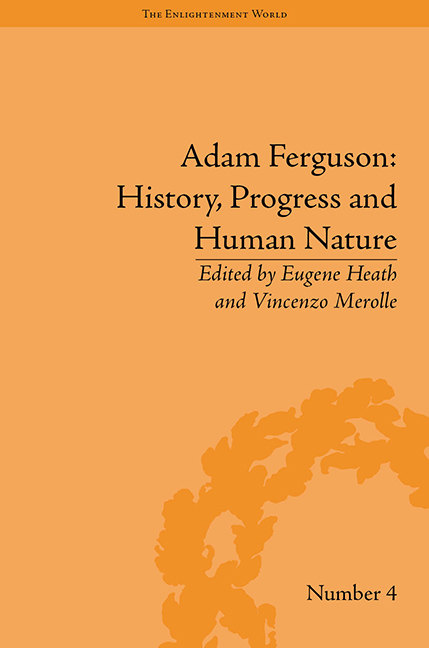Book contents
- Frontmatter
- CONTENTS
- Contributors
- Introduction
- I Life and Works
- II In History
- III On History
- IV Human Nature, Action and Progress
- 9 Ferguson's Politics of Action
- 10 Ferguson and the Active Genius of Mankind
- 11 Providence and Progress: The Religious Dimension in Ferguson's Discussion of Civil Society
- Notes
- Works Cited
- Index
11 - Providence and Progress: The Religious Dimension in Ferguson's Discussion of Civil Society
from IV - Human Nature, Action and Progress
- Frontmatter
- CONTENTS
- Contributors
- Introduction
- I Life and Works
- II In History
- III On History
- IV Human Nature, Action and Progress
- 9 Ferguson's Politics of Action
- 10 Ferguson and the Active Genius of Mankind
- 11 Providence and Progress: The Religious Dimension in Ferguson's Discussion of Civil Society
- Notes
- Works Cited
- Index
Summary
Scholars who have examined the political and social thought of Adam Ferguson often conclude that he is a secular thinker. They discern no theological dimension to his theories of society and progress, despite Ferguson's religious upbringing and education. In his notable study, David Kettler overstates the case, arguing that ‘Ferguson's thought was fundamentally secular – and certainly not Christian’. It is true that Ferguson's theology is not classically Christian: He hardly touches on issues of original sin, revelation or redemption. In discussions concerning providence and immortality, he refers not so much to the Church Fathers as to Stoic writers, including Aurelius, Epictetus and Cato, among others. His theology is unequivocally derived from the book of nature, not the book of words. Ferguson insisted on reinstating the connection between morality and religion, unlike Bernard Mandeville or David Hume, whose moral philosophies severed the connection between the two. Within Ferguson's reasoned theories of society, one glimpses his lifelong attempt to combine a conception of progress with that of divine providence. In fact, his providentialism tends to be of a rational and systematic sort in that it does not require divine intervention but designed order, regularity and an overall structuring of cause and effect to beneficial ends. Within such a providential order, Ferguson argued that humans were to conduct themselves according to moral laws that were unmistakably prescribed by God. ‘In chusing what is morally good, it is happy to know that we obey our Creator; and in obeying our Creator, it is happy to know, that what he commands is the specific good, and felicity of our nature’. God is providential in that it is God's power and design that sustain the universe and guide human destiny. Ferguson's ideas of civil society and morality rest upon his understanding of the human being as a uniquely important creation.
The present paper argues that one cannot fully appreciate Ferguson's critique of civil society unless one comprehends the religious aspect of his thought, specifically that of providence.
- Type
- Chapter
- Information
- Adam FergusonHistory, Progress and Human Nature, pp. 171 - 186Publisher: Pickering & ChattoFirst published in: 2014



